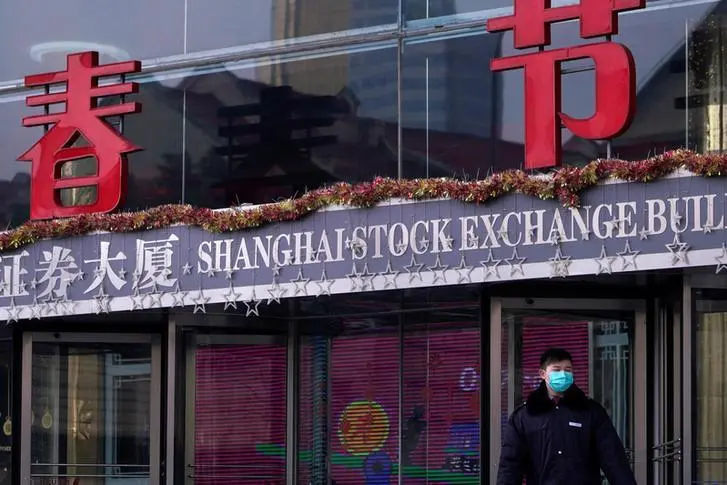PHOTO
SYDNEY - Asian stocks recovered from earlier losses on Tuesday, lifted by firmer U.S. equity futures and central bank comments aimed at soothing fears about rising bond yields and inflation.
A pullback in U.S. bond yields also buoyed equity markets.
Japan's Nikkei rallied 1.02% on Tuesday afternoon, while MSCI's broadest index of Asia-Pacific shares outside Japan was 0.10% higher.
Chinese blue chips added 0.03%, after earlier hitting their lowest level this year.
People's Bank of China Vice Governor Chen Yulu told Yicai Global that China's money supply would grow only to match GDP growth and the country's central bank did not see a need for major stimulus support in the next five years.
NASDAQ futures bounced 1.1% and S&P 500 futures 0.73%. European futures were slightly lower, however, with EUROSTOXX 50 futures down 0.13% and FTSE futures 0.25% lower.
"I suspect that is what's leading the better tone in Asia," Stephen Miller, market strategist for GSFM Funds Management, referring to U.S. futures and the central banker's remarks.
"From time to time soothing comments coming from officials - whether PBOC officials, whether Fed Reserve, ECB or the Reserve Bank of Australia officials - might calm markets but I think all of those things would prove ephemeral if U.S. bond yields continue to march higher, and I think there's a significant risk of that."
Miller added that an easing in U.S. 10-year Treasury bond yields also helped sentiment.
U.S. Treasury Secretary Janet Yellen said on Monday that President Joe Biden's coronavirus aid package would provide enough resources to fuel a "very strong" U.S. economic recovery, and noted "there are tools" to deal with inflation.
Despite the positive cues, investors remain conflicted over whether the stimulus will help global growth rebound faster from the COVID-19 downturn or cause the world's biggest economy to overheat and lead to runaway inflation.
"The chance of our seeing more inflation in the economy is meaningfully increased by the monetary policy actions and the fiscal policy actions that we're seeing around the world," Goldman Sachs Chief Executive Officer David Solomon told a conference in Sydney via webcast.
"There is certainly a reasonable outcome where inflation accelerates more quickly than people are expecting, and that will obviously have an impact on markets and volatility."
The technology sector and other richly valued companies have been highly susceptible to the rising rates.
Australian shares tracked overnight gains on Wall Street with the main S&P/ASX 200 index climbing as much as 1.04% on Tuesday. However, Australian tech stocks slid for the sixth straight session in line with their U.S. peers.
The index gave back those gains to be only 0.48% higher in afternoon trading following the tech declines. Hong Kong's Hang Seng .HSI advanced 1.4%, while South Korea's KOSPI fell 0.74%.
U.S. economic data pointed to a continued recovery, as the Commerce Department said wholesale inventories increased solidly in January despite a surge in sales, suggesting inventory investment could again contribute to growth in the first quarter.
On Wall Street, the Dow advanced overnight while the Nasdaq shed over 2%, marking a more than 10% fall since its Feb. 12 closing high and confirming a correction in the index's value.
The Dow Jones Industrial Average rose 0.97%, the S&P 500 lost 0.54%, and the Nasdaq Composite dropped 2.41%.
"If rates are grinding higher because people are getting optimistic about what economic growth looks like, that is still supportive for equity prices," said Tom Hainlin, global investment strategist at U.S. Bank Wealth Management's Ascent Private Wealth Group in Minneapolis.
U.S. Treasury yields have been advancing as investors price in higher inflation and more upbeat prospects for the U.S. economy as it emerges from the coronavirus pandemic.
On foreign exchange markets, the dollar index held near a 3-1/2-month high against its rivals as expectations of a faster economic normalisation from the pandemic in the United States put the currency at an advantage. The euro was up 0.1% at $1.185.
Oil prices rose on Tuesday, helped by a likely drawdown in crude oil inventories in the United States, the world's biggest fuel consumer.
Brent crude futures were up 56 cents, or 0.82%, at $68.80 per barrel. U.S. crude futures were 50 cents, or 0.75% higher at $65.55.
Spot gold added 0.4% to $1,687.66 an ounce.
(Reporting by Paulina Duran in Sydney and Matt Scuffham in New York; Editing by Christian Schmollinger and Jacqueline Wong) ((matthew.scuffham@thomsonreuters.com; +1-416-687-7591; Reuters Messaging: matthew.scuffham.reuters.com@reuters.net))





















